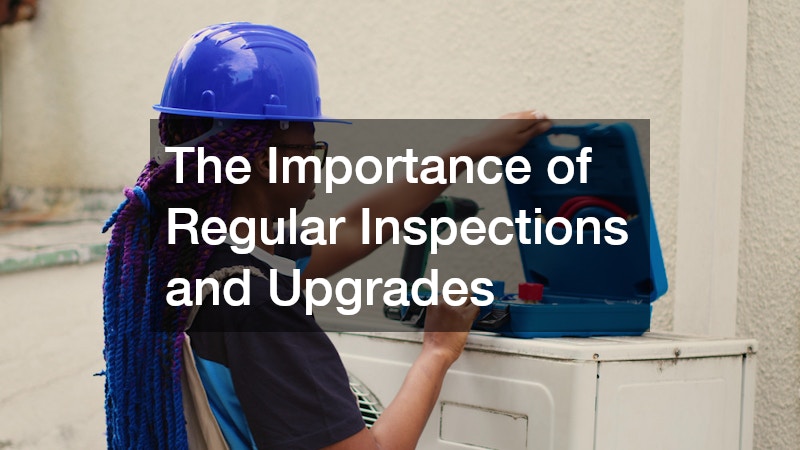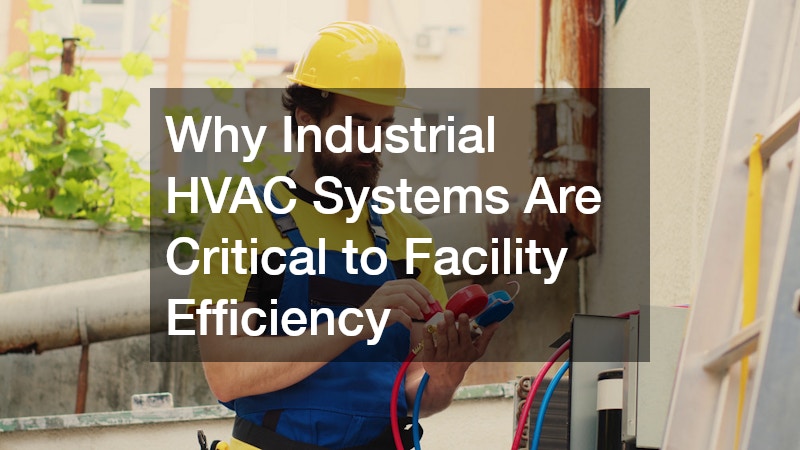In industrial settings, heating, ventilation, and air conditioning (HVAC) systems are often seen as the backbone of operational efficiency. These systems are not only essential for maintaining a comfortable environment for employees but also play a crucial role in ensuring the optimal performance of machinery and equipment. As industries strive for greater productivity, understanding the role of HVAC systems in enhancing facility efficiency becomes a priority.
The Role of Energy-Efficient Components
Industrial HVAC systems are composed of an array of energy-efficient components that significantly reduce power consumption. Advanced compressors, energy recovery ventilators, and variable speed drives contribute to lowering energy usage.
The integration of programmable thermostats and zoning systems also aids in optimizing HVAC operations by allowing tailored temperature settings for different facility zones.
Energy-efficient components are designed to work synergistically, leading to substantial energy saving without compromising performance. For example, variable-speed drives adjust the motor speed to the specific demand, which reduces electricity consumption significantly during lower load periods. With the growing emphasis on sustainability, adopting energy-efficient HVAC solutions has become a cornerstone of industrial facility management strategies.
Reducing Operational Costs Through Advanced Technologies
Advanced HVAC technologies facilitate significant reductions in operational costs through smart energy management and automation. Systems equipped with IoT connectivity enable remote monitoring and management, leading to optimized energy consumption patterns. Predictive maintenance technologies further help to preempt costly breakdowns, thereby ensuring uninterrupted operations.
Automation and data-driven insights allow for real-time adjustments based on environmental variables, which can enhance the system’s overall efficiency. For example, in response to changing occupancy levels or varying production schedules, the HVAC system can adjust its function accordingly, minimizing waste. Furthermore, such advanced technologies empower facility managers to forecast and plan for potential downtimes, reducing unexpected disruptions and associated costs.
Long-term Benefits of Sustainability and Energy Management
Sustainability is becoming increasingly crucial in industrial operations, with HVAC systems playing a pivotal role in green initiatives. Sustainable HVAC solutions not only improve facility efficiency but also enhance the corporate image by showcasing a commitment to environmental stewardship. These solutions often qualify for energy rebates and incentives, further justifying the initial investment.
Long-term sustainability benefits stem from reduced emissions and a lower carbon footprint, achieved by employing greener technologies. Organizations that integrate sustainability into their core operations often experience uplifted stakeholder perception, which can translate into a competitive advantage. Furthermore, energy management systems are key in facilitating compliance with evolving environmental regulations, potentially avoiding costly penalties and reputational damage.
Routine Maintenance and Its Impact on System Longevity
Regular maintenance is crucial in enhancing the operational life of industrial HVAC systems. Routine inspections and cleanings prevent minor issues from escalating into major problems that could halt operations. Scheduled maintenance tasks, such as filter replacements and coil cleanings, ensure efficiency and reliability.
Maintenance activities should be conducted by qualified technicians to ensure all components are functioning at optimal levels. Ignoring routine maintenance can lead to diminished air quality and increased energy consumption, both of which negatively impact system longevity. As HVAC systems represent a significant investment, regular upkeep protects this asset, maximizing its usability over time.
The Importance of Regular Inspections and Upgrades
Regular inspections are integral in identifying inefficiencies and potential areas for improvement within the HVAC system. These inspections should be comprehensive, covering all components from thermostats to ductwork, as the smallest issue can affect overall system performance. Periodic system reviews also allow industrial facilities to keep pace with technological advancements through strategic upgrades.
Upgrading components, such as adopting advanced controls or replacing obsolete equipment, ensures the system remains current with energy standards. Implementing cutting-edge technology can optimize operations, reduce energy costs, and enhance system capabilities. Older systems, while potentially still operational, may not offer the efficiency gains and adaptability of modern solutions.
Tailoring Systems to Specific Industry Needs
Customization is key to designing HVAC systems that meet the unique needs of different industries. Each industry has specific temperature and air quality requirements that standard systems may not adequately address. Tailored solutions ensure that HVAC systems align with and support operational objectives effectively.
By customizing HVAC systems, industries can achieve optimal performance and efficiency tailored specifically to their processes and environments. Whether dealing with the high precision required in pharmaceuticals or the robust demands of manufacturing, each solution must be meticulously designed. Thus, customization not only ensures compliance with industry standards but also enhances productivity and energy efficiency.
Balancing Initial Costs with Long-term Efficiency Gains
While the upfront costs of customized industrial HVAC systems can be significant, they often yield substantial long-term efficiency gains. Investments in advanced technologies tailored to specific needs help minimize operational and energy expenses over time. Facilities gain enhanced system performance, reduced downtime, and lower maintenance costs, thereby offsetting the initial expenses.
Industrial HVAC systems are integral to ensuring facility efficiency, offering both immediate and long-term benefits when effectively tailored and maintained. Through energy-efficient components, advanced technologies, and customized solutions, industries can achieve greater operational efficiency and sustainability. By investing in well-designed, industry-specific solutions, businesses can enhance productivity, minimize costs, and contribute to a more sustainable future.

